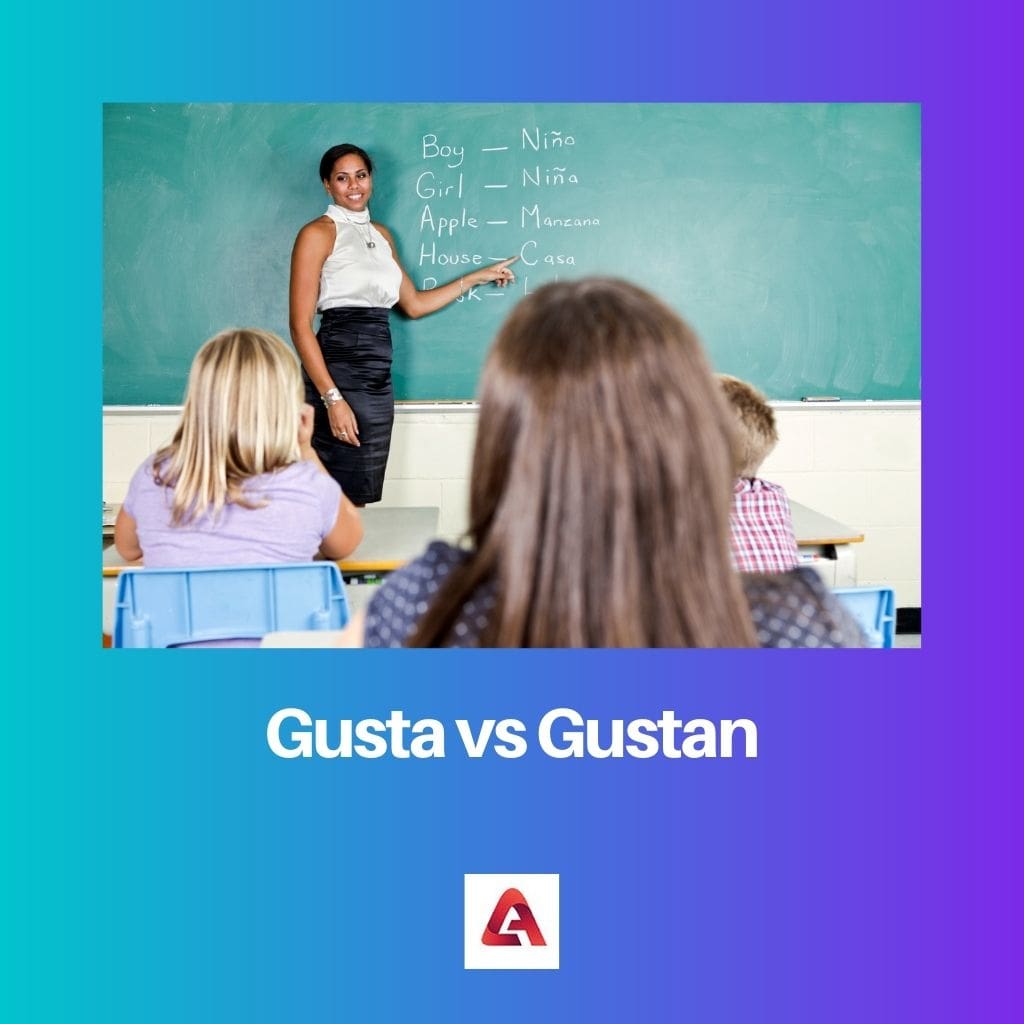Gusta and gustan are two different Spanish verbs. Spanish is exciting and also a critical language. But using similar words can confuse those whose mother tongue is not Spanish.
An excellent example of this is the verb forms of gustar which are gusta and gustan. Their spelling is very similar, and the only difference is the ‘n’ letter at the end of one of them.
Key Takeaways
- “Gusta” is a Spanish verb form used with singular nouns or verbs in the third person singular, meaning “to like” or “to please” in English.
- “Gustan” is the plural form of the same Spanish verb, used with plural nouns or verbs in the third person plural, also meaning “to like” or “to please.”
- Both “gusta” and “gustan” are forms of the Spanish verb “gustar,” but “gusta” is used with singular nouns or verbs, while “gustan” is used with plural nouns or verbs.
Gusta vs Gustan
The difference between gusta and gustan is that gusta is used when the subject is singular, whereas gustan is used when the issue is plural or more than one.

Gustar is the main verb in Spanish, whose meaning is “to like” in English, whereas, in Spanish, the verb has more of a positive vibe to it. In Spanish, the verb gustar refers to the subject you are referring to as “pleasing to” you.
Also, gusta will always be used if the main subject is singular irrespective of the indirect object, which can be singular or plural. The same thing applies to gustan. Gustan will always be used if the main subject is in the plural, irrespective of the indirect object.
Comparison Table
| Parameters of Comparison | Gusta | Gustan |
|---|---|---|
| Definition | Gusta is a Spanish verb that means “to like”. It is used when the subject is singular. | Gustan is a Spanish verb which also means “to like”. It is used when the subject is in the plural. |
| Subject | The subject has to be one or single to use this verb in the sentence. | The subject must be plural or more than one for using this verb in the sentence. |
| Depending on the indirect object | If the main subject is singular, gusta will be used even if the indirect object is plural. | If the main subject is plural, gustan will be used even if the indirect issue is singular. |
| Depending on pronouns | The verb does not depend on if the pronoun refers to a single person or more people. | The verb also does not depend on whether the sentence’s pronoun refers to one person or more. |
| Main verb | The main verb of gusta is gustar. | The main verb of gustan is also gustar. |
What is Gusta?
Gusta is a verb in the Spanish language which means “to like”. It is one of the forms of the main verb “Gustar”.
Gusta is used when the subject is singular or the issue is only one object.
Some examples of the usage of the gusta verb in a sentence are-
- Me gusta esta flor (I like this flower)
- Me gusta este libro (I like this book)
Gusta is used irrespective of the indirect object. This means that if the main subject is singular and the indirect thing is in the plural, gusta will still be used.
In Spanish, the person saying the statement will always be considered an indirect object.
Some examples of this are-
- Nos(indirect object) gusta ese libro(main subject) (We like that book)
- Me(indirect object) gusta ese pez(main subject) (I like that fish)
In the first example above, although the indirect object (we) is in the plural, gusta is still used as the main subject is singular (only one book). In the second example, the indirect object and the main subject are singular, so gusta is used.
The verb is also not dependent on the pronouns used in the sentence. For example, gusta will be used for me, te, nos (I, you, we) if the subject is a single object.

What is Gustan?
Gustan is a verb in the Spanish language which means “to like”. It is also one of the forms of the main verb “Gustar”.
Gustan is used when the subject is plural or has more than one object.
Some examples of the usage of the gustan verb in a sentence are-
- Me gustan estas flores (I like these flowers)
- Me gustan estos libros (I like these books)
Like the verb gusta, gustan is also used irrespective of the indirect object. To be clear, if the main subject is in the plural and an indirect object is a single object, gustan will always be used.
Also, the person saying the statement or the person referred to in the statement will always be considered an indirect object.
Some of the examples are-
- Me (indirect object) gustan esos bolígrafos (main subject) (I like those pens)
- Les (indirect object) gustan estos edificios (main subject) (They like these buildings)
In the first example, an indirect object is a single person (I) while the main subject is in the plural (pens) and thus, gustan is used. In the second example, the main issue is in the plural (buildings), and the indirect object is also in the plural (they), and so gustan is used.
Gustan is also independent of the pronouns used in the sentences. For example, just like that in gusta, gustan will be used for me, te, nos (I, you, we) if the subject is plural or has more than one object.

Main Differences Between Gusta and Gustan
- Gusta and Gustan are both Spanish verbs. The main verb form is Gustar.
- Gusta is used when the object is singular, and Gustar is used when the thing is plural.
- Both gusta and Gustan are independent of the indirect object.
- Both of them are independent of the pronouns used in the sentence.
- Although they mean “to like” in Spanish, it translates into “pleasing to”, which positively affects the sentence.

Very well-articulated explanation
Understanding this distinction is crucial in learning Spanish
As a language enthusiast, this article greatly helped me differentiate between Gusta and Gustan.
The comparison table simplifies the usage of ‘Gusta’ and ‘Gustan’ brilliantly.
The comparison table is a useful addition for learners
This post provides a great explanation of a common confusion when learning Spanish
Learning something new about the Spanish language every day. Very interesting!
The article does a great job at breaking down the difference between ‘Gusta’ and ‘Gustan’.
I’ve always been confused about this, but now it’s clear
Learning a new language can be challenging, but this post makes it easier.